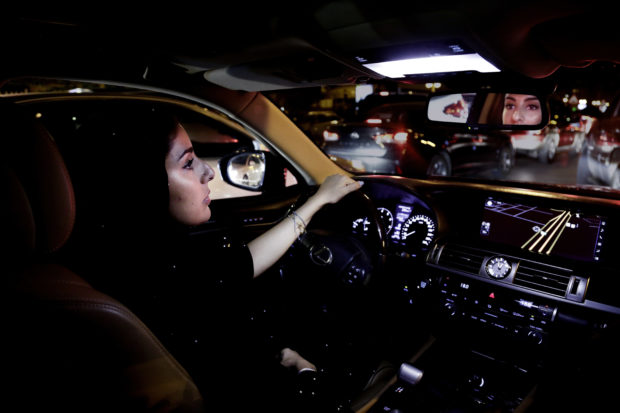Saudi women hit the roads after driving ban is lifted

Hessah al-Ajaji drivers her car down the capital’s busy Tahlia Street after midnight for the first time in Riyadh, Saudi Arabia on June 24, 2018. AP
RIYADH, Saudi Arabia — Saudi women steered their cars through busy streets for the first time on Sunday after the world’s last remaining ban on women driving was lifted.
It’s a historic moment for women who have had to rely on their husbands, fathers, brothers and drivers to run basic errands, get to work, visit friends or even drop kids off at
school. The ban had relegated women to the backseat, restricting when and how they move around.
But after midnight Sunday, Saudi women finally joined women around the world in being able to get behind the wheel of a car and simply drive.
“I’m speechless. I’m so excited it’s actually happening,” said Hessah al-Ajaji, who drove her family’s Lexus down the capital’s busy Tahlia Street after midnight.
Al-Ajaji had a U.S. driver’s license before obtaining a Saudi one and appeared comfortable at the wheel as she pulled up and parked. As for the male drivers on the road, “they were really supportive and cheering and smiling,” she said.
In a few hours, she says she’ll drive herself to work for the first time in Saudi Arabia.
Article continues after this advertisementFor nearly three decades, outspoken Saudi women and the men who supported them had called for women to have the right to drive. They faced arrest for defying the ban even as women in other conservative Muslim countries drove freely.
Article continues after this advertisementIn 1990, during the first driving campaign by activists, women who drove in the capital, Riyadh, lost their jobs, faced severe stigmatization and were barred from travel abroad for a year.
Ultraconservatives in Saudi Arabia had long warned that allowing women to drive would lead to sin and expose women to harassment. Ahead of allowing women to drive, the kingdom passed a law against sexual harassment with up to five years in prison for the most severe cases.
Criticism against women driving has largely been muted since King Salman announced the lifting of the ban last year. But at least 10 of the most outspoken supporters of women’s rights were arrested just weeks before the ban was lifted, signaling that only the king and his powerful son, Crown Prince Mohammed bin Salman, will decide the pace of change.
With state-backed support for the move, many Saudis now say they support the decision allowing women to drive and see it as long overdue.
Tahani al-Dosemani drove her husband and two kids to the store Sunday morning, the kind of errand she’d need a man for in the past.
“As you can see here, I am heading to the supermarket with my family,” she said.” I am depending on myself. All the family shopping needs, and going to school and everything. All these things I can now do by myself.”
Not all women are driving at once, though. The overwhelming majority of women in Saudi Arabia still don’t have licenses. Many haven’t had a chance to take the gender-segregated driving courses that were first offered to women only three months ago. There’s also a waiting list of several months for the classes on offer in major cities. And the
classes can be costly, running several hundred dollars.
Other women already own cars driven by chauffeurs and are in no rush to drive themselves. In many cases, women say they’ll wait before rushing to drive to see how the situation on the streets pans out and how male drivers react.
“I will get my driver’s license, but I won’t drive because I have a driver. I am going to leave it for an emergency. It is one of my rights and I will keep it in my purse,” said 60-year-old Lulwa al-Fireiji.
While some still quietly oppose the change, there are men openly embracing it.
“I see that this decision will make women equal to men and this will show us that women are capable of doing anything a man can do,” said Fawaz al-Harbi. “I am very supportive and in fact I have been waiting for this decision so that my mother, my sisters will drive.” /ee
Associated Press writers Fay Abuelgasim and Malak Harb contributed to this report.